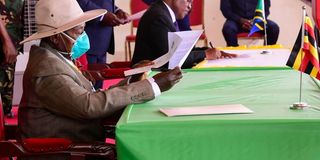Great leap forward for Uganda’s oil production

President Museveni (with hat) and his Tanzania counterpart John Pombe Magufuli sign the agreement on the oil pipeline in Chato District, Tanzania, on Sunday. PHOTO | PPU
What you need to know:
The issue: Uganda’s oil
Our view: Should this commercial oil production reach its peak, the World Bank also estimates that Uganda could earn upwards of $3b (about Shs7 trillion) in revenues from exports of up to 60,000 barrels of oil per day.
Last week ended with some surprising good news – that the Government of Uganda, and French oil giant Total E&P – had concluded negotiations on the Host Government Agreement (HGA). This agreement is significant because it is the contract that governs rights and obligations of Total E&P as a foreign investor in a host country with regard to a project.
The HGA, therefore, provides the governing document for commercialisation of the $3.55b East African Crude Oil Pipeline, which had dragged on for three years longer than was expected. The good news is also that the HGA touches on other minor agreements, including the shareholder agreement, transportation agreement, project financing agreement, among others, which agreements should be expedited to actualise the project.
In sum, the HGA also governs the oil export pipeline project in Uganda. This now signals increased oil project activities, including land acquisition in areas the oil pipeline will run through while respecting the rights of project-affected communities, and engaging in constructive dialogue with community-based rights non-governmental organisations working in these areas.
What’s more, President Museveni’s follow up meeting to nudge President John Pombe Magufuli of Tanzania to ‘resolve other pending issues’ on the other side, demonstrates the seriousness to see through the 1,445-kilometre-long oil pipeline project.
All these activities are good creators of the required enabling environment in kick-starting the long-anticipated commercial oil production, which the World Bank projects, will offer Uganda’s long-term prospects to diversify its economy and catapult the country to an upper middle income status by 2040. Should this commercial oil production reach its peak, the World Bank also estimates that Uganda could earn upwards of $3b (about Shs7 trillion) in revenues from exports of up to 60,000 barrels of oil per day.
These huge revenues have the potential to propel the economy up to between 7 per cent and 10 per cent forecast, up from the current stagnation at 4 per cent. As President Museveni with optimism, said: “Our oil will be used to develop our infrastructure, and ICT to enhance durable capacity of our country.”
While at least $10b (about Shs36 trillion) will be realised in related development of the oil fields, the proposed East African Crude Oil Pipeline, and a refinery in Hoima District, by the oil companies Total E&P and Chinese oil company Cnooc, has to be invested, this first step in concluding HGA is great leap forward in not only creating the enabling environment, but also paving way for the Final Investment Decision in the coming months to start our oil production, including drilling, refining and selling of the country’s oil.


